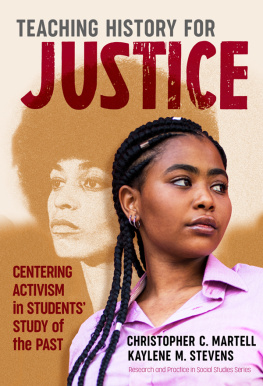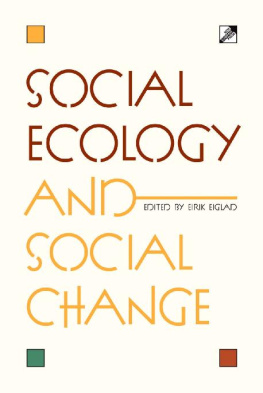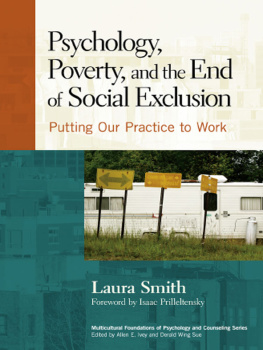NEW APPROACHES IN SOCIOLOGY
STUDIES IN SOCIAL INEQUALITY, SOCIAL
CHANGE, AND SOCIAL JUSTICE
Edited by
Nancy A. Naples
University of Connecticut
A ROUTLEDGE SERIES
NEW APPROACHES IN SOCIOLOGY
STUDIES IN SOCIAL INEQUALITY, SOCIAL CHANGE, AND SOCIAL JUSTICE
NANCY A.NAPLES, General Editor
THE SOCIAL ORGANIZATION OF POLICY
An Institutional Ethnography of
UN Forest Deliberations
Lauren E. Eastwood
THE STRUGGLE OVER GAY, LESBIAN, AND
BISEXUAL RIGHTS
Facing Off in Cincinnati
Kimberly B. Dugan
PARENTING FOR THE STATE
An Ethnographic Analysis of
Non-Profit Foster Care
Teresa Toguchi Swartz
TALKING BACK TO PSYCHIATRY
The Psychiatric Consumer/Survivor/
Ex-Patient Movement
Linda J. Morrison
CONTEXTUALIZING HOMELESSNESS
Critical Theory, Homelessness, and
Federal Policy Addressing the Homeless
Ken Kyle
LINKING ACTIVISM
Ecology, Social Justice, and Education
for Social Change
Morgan Gardner
LINKING ACTIVISM
ECOLOGY, SOCIAL JUSTICE, AND EDUCATION
FOR SOCIAL CHANGE
Morgan Gardner
Routledge
New York & London
Published in 2005 by | Published in Great Britain by |
Routledge | Routledge |
Taylor & Francis Group | Taylor & Francis Group |
270 Madison Avenue | 2 Park Square |
New York, NY 10016 | Milton Park, Abingdon |
OxonOX14 4RN |
2005 by Taylor & Francis Group, LLC
Routledge is an imprint of Taylor & Francis Group.
Transferred to Digital Printing 2009
International Standard Book Number-10: 0-415-97459-3 (Hardcover)
International Standard Book Number-13: 978-0-415-97459-2 (Hardcover)
Library of Congress Card Number 2005011677
No part of this book may be reprinted, reproduced, transmitted, or utilized in any form by any electronic, mechanical, or other means, now known or hereafter invented, including photocopying, microfilming, and recording, or in any information storage or retrieval system, without written permission from the publishers.
Trademark Notice: Product or corporate names may be trademarks or registered trademarks, and are used only for identification and explanation without intent to infringe.
Library of Congress Cataloging-In-Publication Data
Gardner, Morgan.
Linking activism : ecology, social justice, and education for social change / Morgan Gardner.
p. cm. (New approaches in sociology)
Includes bibliographical references and index.
ISBN 0-415-97459-3
1. Social values. 2. Social action. 3. Environmental justice. 4. Social justice. 5. Collective
behavior. I. Title. II. Series.
HM681.G37 2005
303.372-dc22
2005011677
ISBN 10: 0-415-97459-3 (hbk)
ISBN 10: 0-415-80393-4 (pbk)
ISBN13: 978-0-415-97459-2 (hbk)
ISBN13: 978-0-415-80393-9 (pbk)
Publisher's Note
The publisher has gone to great lengths to ensure the quality of this reprint but points out that some imperfections in the original may be apparent.
| Visit the Taylor & Francis Web site at
http://www.taylorandfrancis.com
and the Routledge Web site at
http://www.routledge-ny.com |
Taylor & Francis Group
is the Academic Division of T&F Informa plc. |
To
Mikaela Mary Joy
who lives life's connections in wonderment
My warm thanks are extended to family, friends, and colleagues who have given in direct and indirect ways to this project. Thanks to Michelle Meyer who has given invaluable forms of care, encouragement, and feedback since the inception of this work. Thanks to friends and colleagues Kathleen Cooper, Sobia Shaikh, Diana Gustafson, Nancy Quinn, and Si Transken for their insights, listening, and counsel at different stages of this project. I am also indebted to Margrit Eichler, Ardra Cole, and Budd Hall for their encouragement and review of my work. I am deeply appreciative to each activist who participated in this study for the sharing of their experiences and insights. My thanks to Frank Williams for his research assistance support; Alfred Dyck for his work on contained in this book; and Roberta Hammett for helping me navigate resources. To family members Mary Gardner, Mikeala Clark Gardner, Stephen Clark, and Hugh Clark thank you for your care, encouragement, and love of learningall qualities which have enriched my work on this project. Thanks to both long time and recent friends who are here for the richness of the journeyCatherine, Sobia, Alf, Mary Lou, Alan, Rita, Clar, Bobbi, Ursula, and the Green Amazons. Thanks to Memorial University and to my colleagues in the Faculty of Education who provide a vibrant place to pursue research, scholarship, and teaching.
Journal note: Looking back I realize I witnessed the links between social justice and environmental protection from a young age. As a child I remember noticing that the air was dirtier in the poor parts of town. I recall a family friend's husband sick and dying with a lung disease from years of working unprotected in the mines. I saw First Nations communities living adjacent to waste dumps. And I have seen many homeless men, women, and children sleeping in filthy urban streets. These experiences haunted me as a child, and as I grew older they became buried inside me, as if, in some respects, they never existed. And in a way, this was true, because the societal culture around me was not recognizing or acting on these forms of social and ecological oppression. The dominant culture around me treated these injustices as if they were invisible.
I didn't begin to truly confront my own collusion with these forms of socially constructed invisibility until my early twenties when I became involved in environmental advocacy. I started catching myself in one instance, and then in another, unwittingly living my activism in ways which isolated rather than linked social justice and environmental practice. I began realizing that many of my activist assumptions, standpoints, and practices needed re-examination. From the outside, this awareness of fragmentation challenged me to open myself to the complex dimensions and layers of social change work. For instance, I began asking, how would workers and communities impacted by environmental reforms be dealt with justly? Do our environmental efforts resonate with minoritized individuals? As activists, are we aware of the ways our social locationality frames our environmental work? What blocks environmental activists from asking certain kinds of socially related questions?
From the inside, I began experiencing the desire to gather and integrate different values, experiences, and positionalities within me. While the nature-lover, the strategist, and rabble-rouser in me were well utilized in my environmental work, my feminist, spiritual, and social justice values needed to influence my agency more strongly. I began making feminist analyses of environmental problems and solutions visible in my activism. I started advocating for consensus decision-making in environmental decision-making forums. I struggled to embody a holistic approach to environmental change-making






